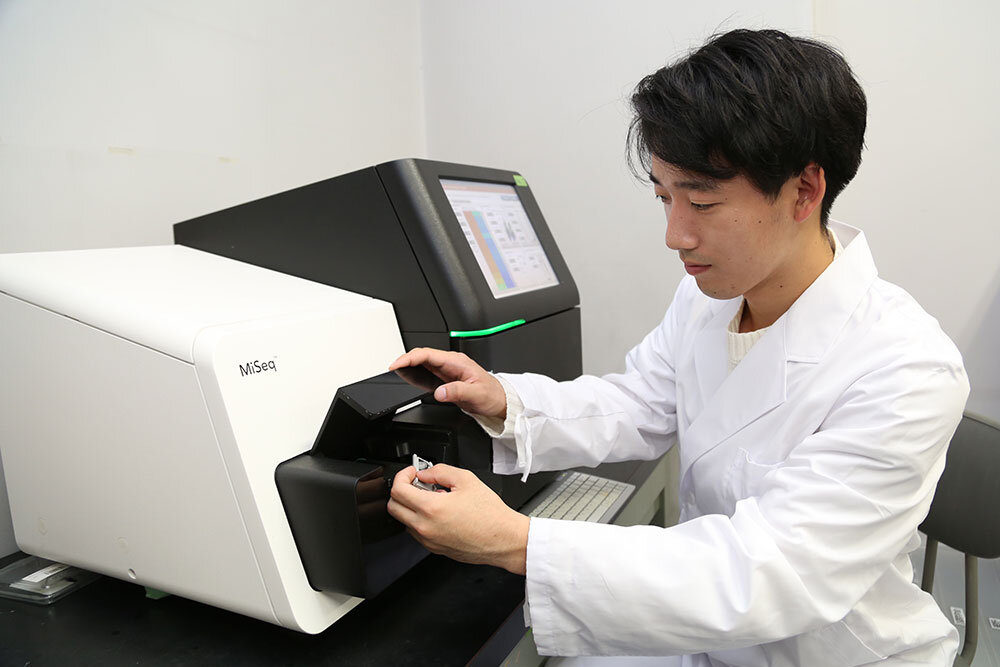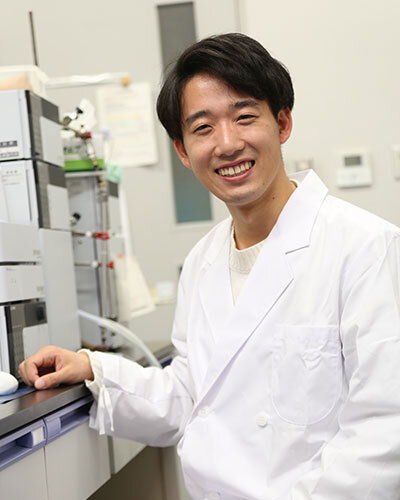INTRODUCTION学生紹介
- HOME
- support
- Student Introduction
- YOSHIZAWA SOICHIRO
STUDENT INTRODUCTION
Marine Life Sciences
YOSHIZAWA SOICHIRO
Specializations:Marine Bio Engineering
Main academic advisor:KONDO, Hidehiro
Mentor:KOIWAI, Keiichiro / YAZAWA, Ryosuke

Research into fish is linked to medicine and helping people—I experienced real personal growth from the first steps of learning AI
I wanted to learn AI in the WISE Program, and that decided my research topic
I entered Tokyo University of Marine Science and Technology because of my liking for living creatures, especially fish. I barely studied AI at all as an undergraduate, but I was interested in AI data science and research using computers. I first found out about the WISE Program from my academic advisor, and the opportunity to learn about AI made me determined to join. I conceived the idea of investigating shark immunology as a research topic that combines my interest in fish with AI. I only began learning about AI in graduate school, and I had to start from the basics.
I experienced real personal growth after half a year of study
I only started learning about AI after joining the WISE Program, and I really felt far behind my classmates who had majored in engineering. After half a year of study, however, I really felt my knowledge beginning to grow. For example, I could now understand the machine-learning techniques used in other research projects. Even if I couldn't understand the programming code, I grew to understand how the computer was processing and analyzing data, and I was happy to feel that my studies had been worthwhile.
 A wide variety of programming languages are used in WISE Program classes including the language I use, which is called Python. Under the program, I learned how to use Python from the very first steps--what programs can accomplish what tasks--from which I moved on to the implementation of simple data analysis and machine learning.
A wide variety of programming languages are used in WISE Program classes including the language I use, which is called Python. Under the program, I learned how to use Python from the very first steps--what programs can accomplish what tasks--from which I moved on to the implementation of simple data analysis and machine learning.
The students have a broad range of levels, with everyone in the same class. In class group work, we discuss topics with other students, and the higher-level students explain more advanced topics to us, even if the teacher hasn't covered them yet. The novice students can also sometimes ask questions and receive explanations, so it helps everyone gain a better mutual understanding and understand the topic more deeply. This course has provided me with a foundation that has helped me understand my current research.
Recently, the progress I have made in understanding AI has given me the confidence to try other things I thought would be too difficult for me. While I still cannot write code independently, I can modify and adapt code used in other research for the purposes of my own research. In this way, I'm able to fully utilize my study under the WISE Program in my own research.
Thanks to the economic support I receive under the program, I can use my time for research rather than casual work
One attraction of the WISE Program is the economic support it provides. In addition to monthly economic assistance, the program pays for research expenses. This has enabled me to purchase an electronic tablet and reagents that I use in my research. Purchases that are included in the initial research plan are covered by the budget of the university laboratory, but other items must be paid for by the researchers themselves, and many students work casually to pay these expenses. Since the WISE Program provides assistance covering research expenses, however, I'm able to purchase the necessary resources and concentrate on my research without having to spend time on casual work. I'm grateful to be able to devote myself freely to research without worrying about other matters.
Applying research into marine organisms to help people
My research predicts what substances shark antibodies will connect with. There is a regular pattern of substances to which antibodies, which are proteins, will adhere, and machine learning is well suited to predicting this pattern.
Antibodies are used in a wide range of fields such as pharmaceuticals and experimental reagents. What I am doing is close to fundamental research in the field, and it should be applicable not only for marine products but also in medicine, as well as useful for research and experimentation in other fields. I sincerely hope my research on marine organisms is able to help people.
I'm researching the two fields of marine products and information, so after I complete my doctorate, I hope to work in a position that connects multiple fields. There must be jobs that require study across diverse fields, and I will look at my future work from a broad perspective and not limited to academic research. I also hope to address needs in diverse areas, wherever they may occur.
I'm at the university almost every day to study and look after the marine creatures
I arrive at the university at 8:30 a.m. on weekdays. During the day, I carry out experiments, analyze data, and practice programming, and it's 7 or 8 p.m. before I go home. I suppose I spend a lot of time studying at the university. The laboratory keeps live creatures, and I'm often at the university on weekends, too, to care for them. The sharks used in my research are also raised in the laboratory.
While I'm busy with my duties on weekdays, I also have a lot of hobbies, and there are many things on my to-do list. On my "real holidays" when I'm not at the university, I practice my musical instrument in an orchestra I'm a member of, do some physical exercise, or take time out to refresh myself.

